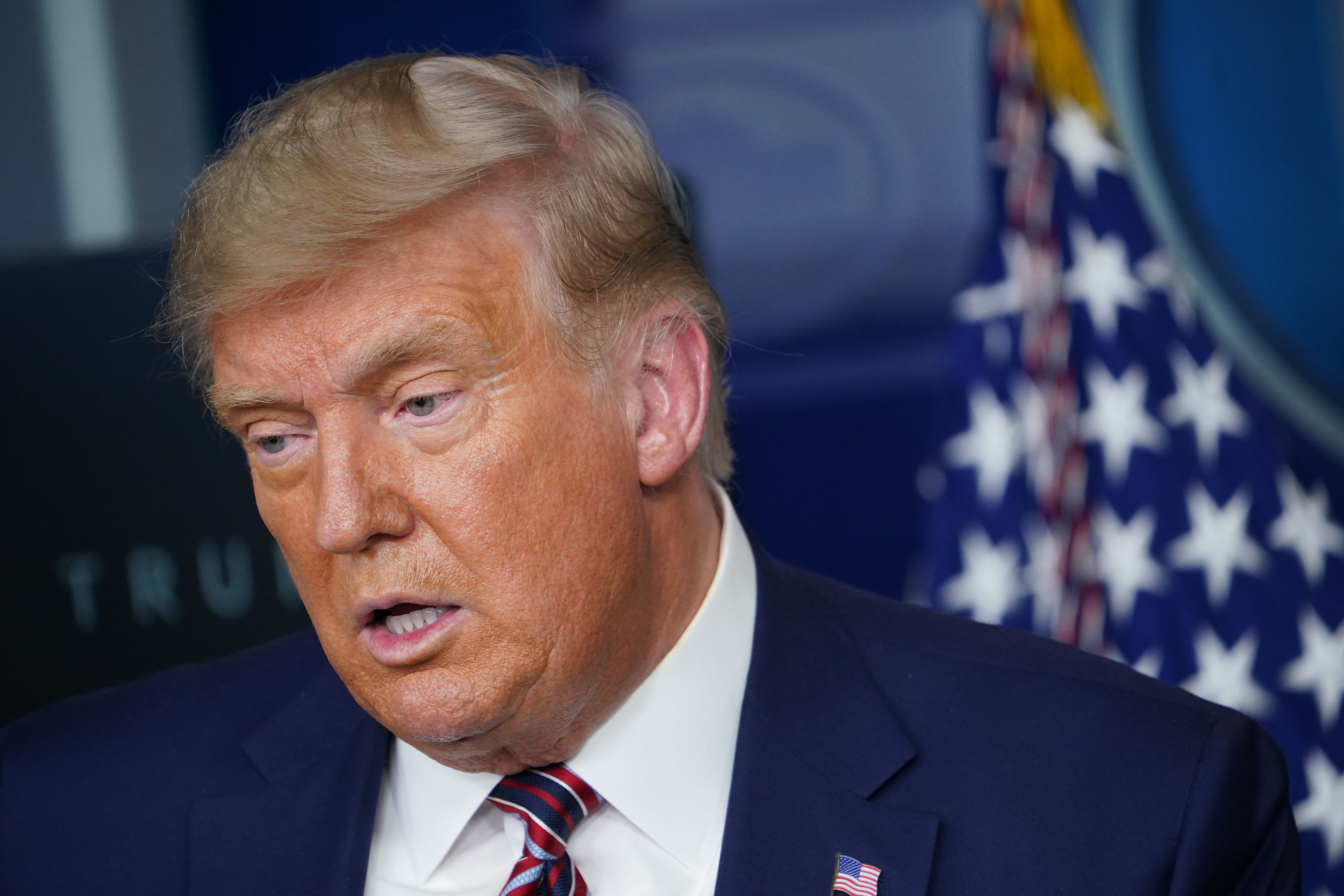US President Donald Trump speaks on lowering prescription drug prices on November 20, 2020, in the Brady Briefing Room of the White House in Washington, DC.
Mandel Ngan | AFP | Getty Images
President Donald Trump‘s last-second opposition to a coronavirus relief and federal funding bill already passed by Congress threatens to torch jobless benefits for millions of Americans and shut down the government during a deadly public health crisis.
After weeks of no involvement in congressional efforts to pass another aid package, the outgoing president shocked Washington on Tuesday night by calling the bill a “disgrace” and pushing lawmakers to increase $600 direct payments to $2,000.
While he did not explicitly say whether he would veto the bill or simply refuse to sign it, Trump said the “next administration will have to deliver a Covid relief package” if Congress does not send him revised legislation.
Any delay in the measure becoming law threatens financial ruin for already struggling Americans. The $900 billion coronavirus relief portion of the bill extends pandemic-era expansions of jobless benefits that cover 12 million people. The provisions expire on Saturday.
Meanwhile, the $1.4 trillion appropriations piece of the legislation would keep the federal government running through Sept. 30. The government would shut down Tuesday if the president fails to sign it into law before then.
A federal eviction moratorium — which the legislation would extend through Jan. 31 — also expires at the end of the year. Tens of millions of people could face the threat of losing their homes if the measure lapses.
After Congress failed to pass new federal aid for most of the year while millions of people fell into poverty, the package would send temporary help in the form of a weekly federal unemployment supplement of $300 through mid-March, the $600 payments and $284 billion in Paycheck Protection Program small business loans. It also contains more than $8 billion for Covid-19 vaccine distribution, $25 billion for rental assistance, $82 billion for education and $45 billion for transportation — including funds to help airlines keep employees on staff.
If Trump vetoes the bill, Congress could reconvene after Christmas to override it. The measure got through both chambers with veto-proof majorities. Lawmakers have already planned for the possibility of returning if the president vetoes a national defense bill.
As it takes days for Congress to formally send Trump a bill of that size, it has not even come to his desk yet. The president could potentially kill the legislation through a so-called pocket veto if it does not get to him until Thursday or later. He could let the full 10-day window to sign the bill (which excludes Sundays) wind down before the new session of Congress starts on Jan. 3.
Trump had weeks to shape the bill to his liking before Congress wrote and passed the 5,593-page rescue package and left Washington for the holidays. Instead, he spent the last six weeks spreading conspiracy theories that widespread fraud cost him the Nov. 3 presidential race against President-elect Joe Biden.
Democrats welcome bigger stimulus checks
Democrats would have welcomed an earlier push for $2,000 direct payments from Trump as Republicans tried to limit the size of the spending package. Indeed, both House Speaker Nancy Pelosi, D-Calif., and Senate Minority Leader Chuck Schumer, D-N.Y., quickly backed a $2,000 check on Tuesday night. They supported it as a measure separate from the $900 billion rescue package.
They still want the president to sign that bill into law. Before Trump changed his tune, his own Treasury Secretary Steven Mnuchin signed off on the $600 payments. Republican congressional leaders did not at first back checks as part of the latest round of talks.
House Democrats aim to approve $2,000 payments by unanimous consent during a pro-forma session on Thursday. Any representative who decides to return to the Capitol on Christmas Eve could block it from passing. The GOP-held Senate may not approve the measure even if the House passes it.
“If the President truly wants to join us in $2,000 payments, he should call upon [House Minority] Leader [Kevin] McCarthy to agree to our Unanimous Consent request,” Pelosi wrote to House Democrats on Wednesday.
She later added: “The entire country knows that it is urgent for the President to sign this bill, both to provide the coronavirus relief and to keep government open.”
Senate Majority Leader Mitch McConnell‘s office has not yet responded to Trump’s gambit. However, at least one member of the Kentucky Republican’s caucus got behind Trump’s push for $2,000 payments.
Sen. Lindsey Graham, R-S.C., tweeted Wednesday that he would support the provision along with a conservative-backed measure to scrap legal liability for internet platforms.
“Let’s vote,” he said.
Sen. Josh Hawley, R-Mo., had joined Sen. Bernie Sanders, I-Vt., in pushing for $1,200 direct payments in the year-end relief bill. Sen. Ron Johnson, R-Wisc., blocked both lawmakers’ attempts to approve the checks.
Sanders and other progressives embraced Trump’s new call for larger direct payments. On Tuesday night, the Vermont senator — who backed a monthly $2,000 payment proposal early in the pandemic — urged Trump to “get Mitch McConnell and your Republican friends to stop opposing” a larger check.
Rep. Alexandria Ocasio-Cortez, D-N.Y., noted that she and Rep. Rashida Tlaib, D-Mich., already wrote a legislative amendment for $2,000 payments.
Despite their support for bigger checks, some Democrats still questioned Trump’s motives in pushing for them now after sitting out the legislative talks.
“Trump took no interest at all in the negotiations. None. It was his own party that insisted the checks be $600,” Sen. Chris Murphy, D-Conn., tweeted Wednesday.
“If you think he cares about the size of the checks, I’ve got a bridge to sell you. All this is is a middle finger to America on his way out the door,” he continued.
